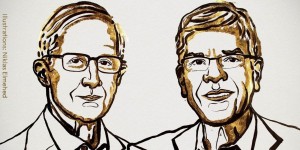From an Article by Lorraine Chow, EcoWatch.com, October 8, 2018
The Royal Swedish Academy of Sciences announced the 2018 Nobel Prize in Economics to a duo for their work on how the world can achieve sustainable growth.
The prize was divided equally to William D. Nordhaus of Yale University and to Paul M. Romer of New York University’s Stern School of Business, both Americans, who have “designed methods for addressing some of our time’s most basic and pressing questions about how we create long-term sustained and sustainable economic growth,” the academy said Monday in a press release.
Nordhaus is known for his pioneering model describing how economic activities drive climate-warming emissions. He is a major advocate of using carbon taxes to reduce greenhouse gas emissions.
He has worked on this topic since the 1970s, when scientists became increasingly worried about fossil fuels contributing to a warming world, the academy said.
Coincidentally, the academy’s announcement was issued the same day that a United Nations’ Intergovernmental Panel on Climate Change (IPCC) issued a report about the catastrophic effects of unmitigated climate change and advised rapid government action. The report builds on and cites Nordhaus’ work, The New York Times reported.
When it comes to averting climate change, “the policies are lagging very, very far—miles, miles, miles—behind the science and what needs to be done,” Nordhaus said in an interview after his win.
He added that the United States has fallen behind in mitigating global warming due to the “disastrous policies” of the Trump administration. President Trump has pushed for fossil fuel usage and infamously pulled the U.S. out of global Paris agreement to limit warming.
Romer, whose work focuses on how economic forces govern the willingness of firms to produce new ideas and innovations, laid the foundation of what is now called “endogenous growth theory,” the academy said. The theory explains how ideas require specific conditions to thrive in a market.
Romer is less pessimistic about the future of the planet in light of the IPCC’s dire report, but said work needs to be done to slash carbon emissions.
“It is entirely possible for humans to produce less carbon,” he said at the press conference announcing his prize. “Once we start to try to reduce carbon emissions, we’ll be surprised that it wasn’t as hard as we anticipated.”
Today marks the 50th anniversary of the Nobel prize in economics.
“The contributions of Paul Romer and William Nordhaus are methodological, providing us with fundamental insights into the causes and consequences of technological innovation and climate change,” the academy said. “This year’s Laureates do not deliver conclusive answers, but their findings have brought us considerably closer to answering the question of how we can achieve sustained and sustainable global economic growth.”


{ 1 comment… read it below or add one }
Sigh. Sustainable economic growth is as real as fairies.
This phrase is an oxymoron.
The planet is finite–and humanity is banging into limits in all directions–so obviously we cannot keep growing our numbers or our per capita impact. Yes, we can increase efficiency and reduce the carbon impact of our economies, but there are limits–we can’t live on air, or trade nothing but ideas. Even if we recycled everything, there is gradual loss, and heat buildup.
The real question is when we need to begin shrinking our economies and our population, and the answer is clearly Yesterday–even WITH all the innovations and efficiencies these two say we need to adopt, which no doubt we do. We’ve already reached the point where the percentage of land vertebrates that are wild, that are anything other than humans or their livestock, is 4%.
Four percent! How long till it’s 1%, a huge mass of humanity and a dozen domesticated species, primarily for food, and a smattering of refugees living in zoos? This is an outrageous ripoff of future generations — among many.